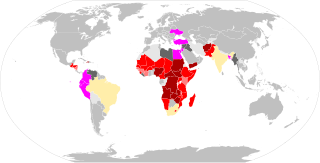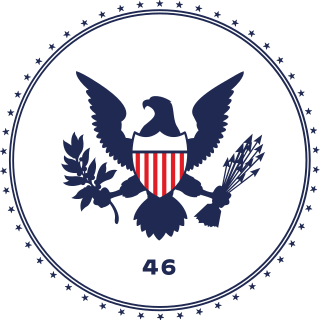Related Research Articles

The World Food Programme (WFP) is the food-assistance branch of the United Nations. It is the world's largest humanitarian organization focused on hunger and food security, and the largest provider of school meals. Founded in 1961, it is headquartered in Rome and has offices in 80 countries. As of 2020, it served 115.5 million people in 80-plus countries, the largest since 2012.

The Defence Research and Development Organisation (DRDO) is the premier agency under the Department of Defence Research and Development in Ministry of Defence of the Government of India, charged with the military's research and development, headquartered in Delhi, India. It was formed in 1958 by the merger of the Technical Development Establishment and the Directorate of Technical Development and Production of the Indian Ordnance Factories with the Defence Science Organisation. Subsequently, Defence Research & Development Service (DRDS) was constituted in 1979 as a service of Group 'A' Officers / Scientists directly under the administrative control of Ministry of Defence.

A cold chain is a low temperature-controlled supply chain. An unbroken cold chain is an uninterrupted series of refrigerated production, storage and distribution activities, along with associated equipment and logistics, which maintain quality via a desired low-temperature range. It is used to preserve and to extend and ensure the shelf life of products, such as fresh agricultural produce, seafood, frozen food, photographic film, chemicals, and pharmaceutical products. Such products, during transport and when in transient storage, are sometimes called cool cargo. Unlike other goods or merchandise, cold chain goods are perishable and always en route towards end use or destination, even when held temporarily in cold stores and hence commonly referred to as "cargo" during its entire logistics cycle. Adequate cold storage, in particular, can be crucial to prevent quantitative and qualitative food losses.

A key worker, critical worker or essential worker is a public-sector or private-sector employee who is considered to provide an essential service. The term has been used in the United Kingdom in the context of workers who may find it difficult to buy property in the area where they work. The term was also used by the UK government during announcements regarding school shutdowns invoked in response to the COVID-19 pandemic to indicate parents whose occupations entitled them to continue sending their children to schools which were otherwise shut down by government policy, as well as teachers and LSAs at those schools.

Hazard controls for COVID-19 in workplaces are the application of occupational safety and health methodologies for hazard controls to the prevention of COVID-19. Vaccination is the most effective way to protect against severe illness or death from COVID-19. Multiple layers of controls are recommended, including measures such as remote work and flextime, increased ventilation, personal protective equipment (PPE) and face coverings, social distancing, and enhanced cleaning programs.

Operation Rescript is the code name for the British military operation to help tackle the ongoing COVID-19 pandemic in the United Kingdom and its Crown Dependencies. It has been described as the UK's "biggest ever homeland military operation in peacetime" by the Ministry of Defence (MOD), involving up to 23,000 personnel within a specialist task force, named the COVID Support Force (CSF). The support is given at the request of the UK government, its devolved administrations and civil authorities through the Military aid to the civil authorities (MACA) mechanism.

The COVID-19 pandemic affects the global food industry as governments close down restaurants and bars to slow the spread of the virus. Across the world, restaurants' daily traffic dropped precipitously compared to the same period in 2019. Closures of restaurants caused a ripple effect among related industries such as food production, liquor, wine, and beer production, food and beverage shipping, fishing, and farming.

Shortages of medical materials, manufacturing and consumer goods caused by the COVID-19 pandemic quickly became a major issue worldwide, as did interruptions to the global supply chain, which has challenged supply chain resilience across the globe. Shortages of personal protective equipment, such as medical masks and gloves, face shields, and sanitizing products, along with hospital beds, ICU beds, oxygen therapy equipment, ventilators, and ECMO devices were reported in most countries.

Operation Broadshare is the code name for the British military operation to address the COVID-19 pandemic overseas, primarily in the British Overseas Territories (BOTs) and British overseas military bases. The operation runs in parallel to a similar military operation in the United Kingdom, named Operation Rescript.

This article documents the chronology of the response to the COVID-19 pandemic in April 2020, which originated in Wuhan, China in December 2019. Some developments may become known or fully understood only in retrospect. Reporting on this pandemic began in December 2019.

The meat industry has been severely affected by the COVID-19 pandemic in the United States. Outbreaks of the virus have taken place in factories operated by the meat packing industry and the poultry processing industry. These outbreaks affected dozens of plants, leading to closures of some factories and disruption of others, and posed a significant threat to the meat supply in the United States. By April 27, 2020, there were at least 115 facilities with cases across 23 states, and at least 4,913 workers diagnosed positive with COVID-19, or approximately 3 percent of the workforce, with 20 deaths reported. By May 5, over 10,000 meatpacking plant workers in 29 states and working at 170 plants had tested positive for the coronavirus. At least 45 of those meat industry workers had died. As of May 20, at least 15,300 workers have been infected with COVID-19 at 192 different meatpacking plants in the United States, based on ongoing reporting by the Midwest Center for Investigative Reporting and USA Today. At least 63 of those workers have died from the disease.

During the COVID-19 pandemic in Canada, outbreaks of the virus took place in factories operated by the meat packing industry and the poultry processing industry. These outbreaks affected multiple plants, leading to closures of some factories and disruption of others, and posing a threat to the food supply in Canada.

During the COVID-19 pandemic, food insecurity has intensified in many places – in the second quarter of 2020 there were multiple warnings of famine later in the year. According to early predictions, hundreds of thousands of people would likely die and millions more experience hunger without concerted efforts to address issues of food security. As of October 2020, these efforts were reducing the risk of widespread starvation due to the COVID-19 pandemic.

Sustainable Development Goal 12, titled "responsible consumption and production", is one of the 17 Sustainable Development Goals established by the United Nations in 2015. The official wording of SDG 12 is "Ensure sustainable consumption and production patterns". SDG 12 is meant to ensure good use of resources, improving energy efficiency, sustainable infrastructure, and providing access to basic services, green and decent jobs and ensuring a better quality of life for all. SDG 12 has 11 targets to be achieved by at least 2030 and progress toward the targets is measured using 13 indicators.

Sustainable Development Goal 2 aims to achieve "zero hunger". It is one of the 17 Sustainable Development Goals established by the United Nations in 2015. The official wording is: "End hunger, achieve food security and improved nutrition and promote sustainable agriculture". SDG 2 highlights the complex inter-linkages between food security, nutrition, rural transformation and sustainable agriculture. According to the United Nations, there are around 690 million people who are hungry, which accounts for slightly less than 10 percent of the world population. One in every nine people goes to bed hungry each night, including 20 million people currently at risk of famine in South Sudan, Somalia, Yemen and Nigeria.

The United Nations response to the COVID-19 pandemic has been led by its Secretary-General and can be divided into formal resolutions at the General Assembly and at the Security Council (UNSC), and operations via its specialized agencies and chiefly the World Health Organization in the initial stages, but involving more humanitarian-oriented agencies as the humanitarian impact became clearer, and then economic organizations, like the United Nations Conference on Trade and Development, the International Labour Organization, and the World Bank, as the socioeconomic implications worsened.
Matthew Maxwell Taylor Kennedy Jr. is an American government volunteer, political organizer, and member of the Kennedy family. He is the whistleblower who sent a complaint to the United States House Committee on Oversight and Reform regarding the White House Coronavirus Task Force, which he worked on as a volunteer. Kennedy now works for the Democratic Party on their 2020 campaign efforts.

The COVID-19 Advisory Board was announced in November 2020 by President-elect of the United States Joe Biden as part of his presidential transition. It was co-chaired by physicians David A. Kessler, Marcella Nunez-Smith, and Vivek Murthy and comprises 13 health experts. The board was then succeeded by the White House COVID-19 Response Team upon Biden's presidency in January 2021.

As of 4 April 2022, 11.29 billion COVID-19 vaccine doses have been administered worldwide, with 64.5 percent of the global population having received at least one dose. While 18.7 million vaccines were then being administered daily, only 14.5 percent of people in low-income countries had received at least a first vaccine by March 2022, according to official reports from national health agencies, which are collated by Our World in Data.
In 2021, as a consequence of the COVID-19 pandemic, global supply chains and shipments slowed, causing worldwide shortages and affecting consumer patterns. Causes of the economic slowdown include workers becoming sick with COVID-19 as well as mandates and restrictions affecting the availability of staff. In cargo shipping goods remain at port - again due to staffing shortages.
References
- 1 2 3 "WHO Director-General's opening remarks at the media briefing on COVID-19 - 10 April 2020". www.who.int.
- ↑ "COVID-19: WHO inaugurates supply chain task force". Healthwise. 9 April 2020. Retrieved 12 April 2020.